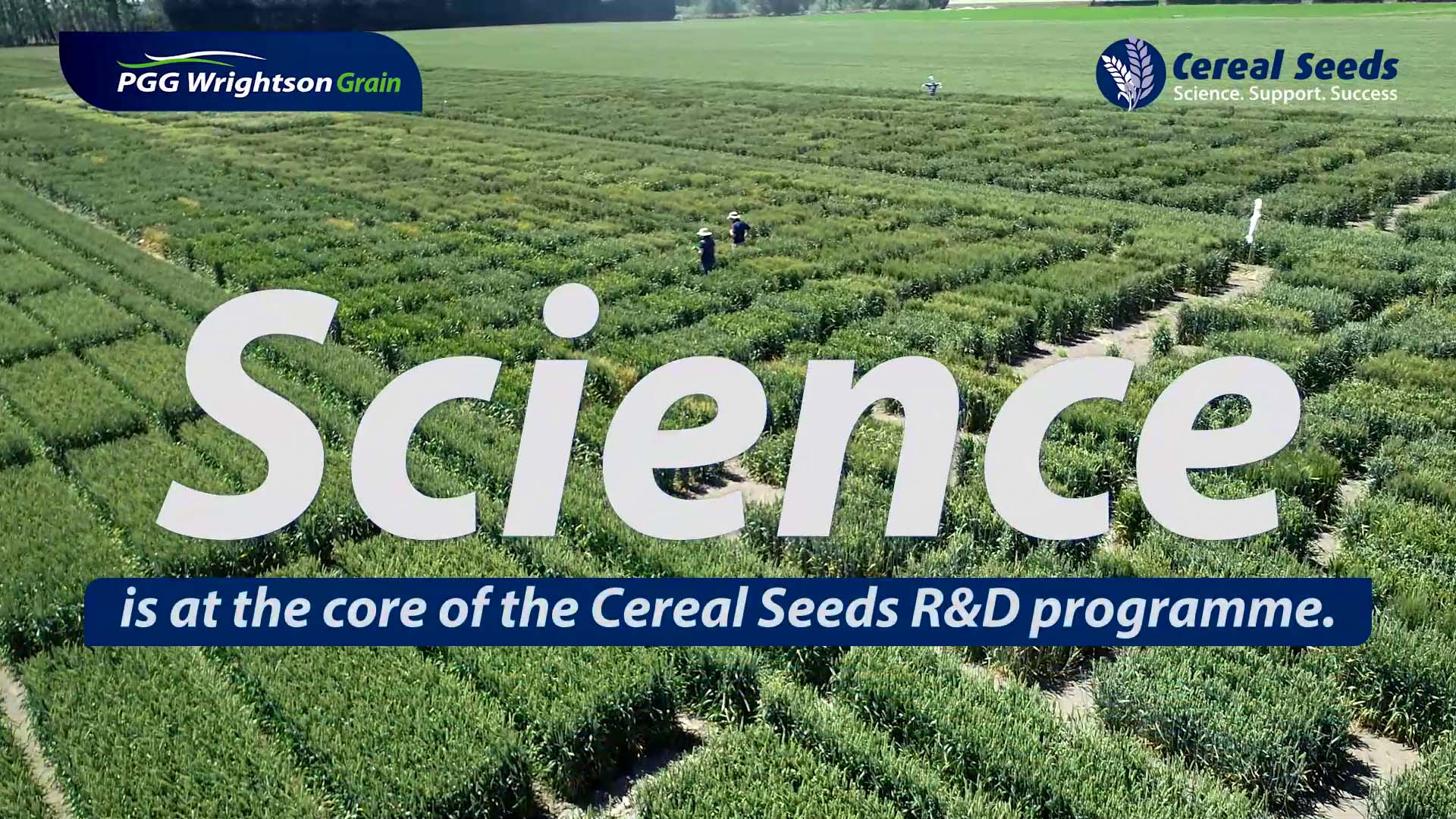About Cereal Seeds
PGG Wrightson Grain leads cereal research in New Zealand, specialising in breeding, evaluation, and agronomy. Our Kimihia Research Centre team pioneers innovative solutions for growers and end-users, driving excellence and sustainability in the industry.
Research and Development Agronomy Breeding Evaluation and Representation industry Colaborations Seed Treatment
PGG Wrightson Grain produces and supplies a significant number of proprietary cereal seed cultivars. The portfolio includes milling, biscuit, feed and purple wheats, milling ryecorn, feed/malting barley and feed triticale seed. The seed and cereal portfolio is supported by extensive plant breeding research and development programmes (refer to research). The cultivars selected to be part of our product portfolio have demonstrated production benefits and advantages in trials over several years prior to commercialisation.
Our seed production systems and processes ensure high quality certified cereal seed is produced and marketed each year. We operate a SEEDTRACTM quality assurance programme which ensures the highest quality cereal seed is produced. Track and Trace is at the heart of this system as is the inspection of crops during the growing season and the testing of seed during our dressing and treating operations. PGG Wrightson Grain aims to deliver the best quality cereal seed, from production all the way through to the customer.
PGG Wrightson Grain is one of the largest private investors in cereal seed research in New Zealand with a proven record in breeding and evaluation, including a comprehensive agronomy programme that optimises the management for individual cultivars delivering an overall cultivar and management package for the benefit of growers and end-users.
The in-house plant breeding is focused on milling and feed wheat with a small grain triticale breeding effort. In addition to the full breeding effort, there are extensive screening and evaluation programmes to identify cultivars for release in NZ from overseas-bred wheat, barley, ryecorn, triticale and Linseed. Finally there is a joint breeding programme with Plant & Food Research on purple wheat as well as other research projects funded by industry bodies such as the Foundation for Arable Research (FAR) and the New Zealand Flour Millers Research Trust (FMRT). Starting in 2020 a programme to develop soft milling cultivars to consistently deliver flour suitable for use in products other than biscuits such as sauce mixes, white salted noodles and ice-cream cones. This programme is being funded by the New Zealand Flour Millers Research Trust (FMRT)
R&D staff are located at the Kimihia Research Centre at Lincoln, Canterbury. Cereal research and agronomy is coordinated from Kimihia with trials located on large scale arable farms throughout the South Island.
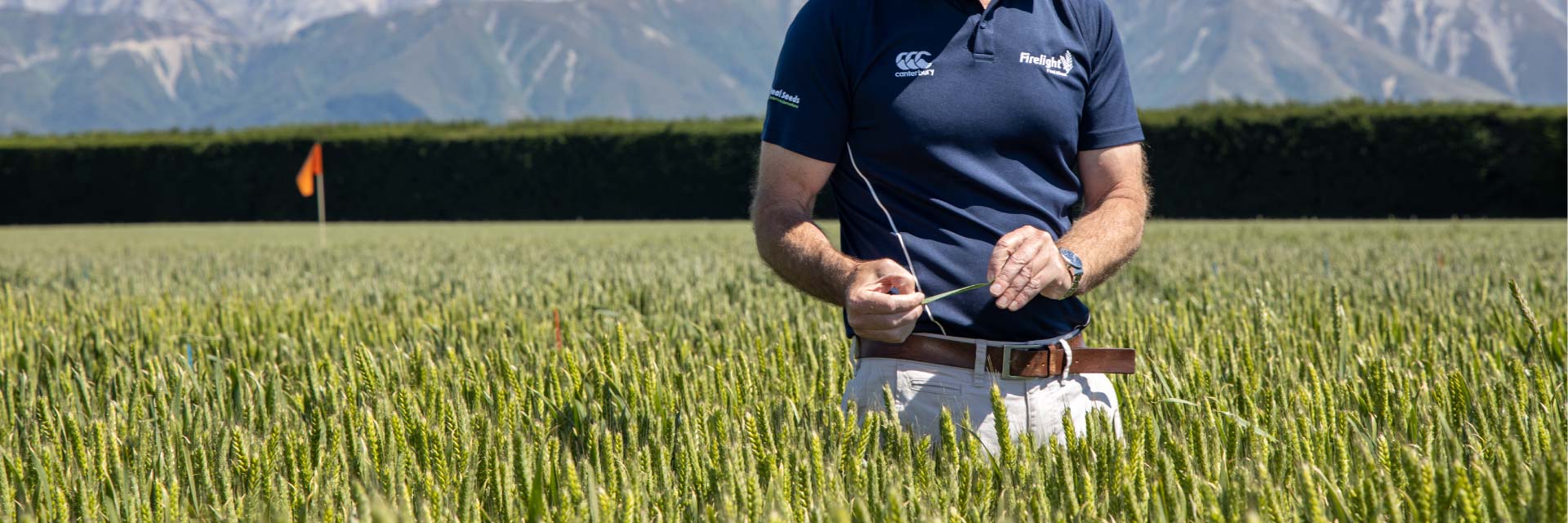
PGG Wrightson Grain has a strong focus on cereal agronomy with an extensive research program focusing on cultivar and product development. PGG Wrightson Grain is the only company in New Zealand investing in the continued research and development of new and existing cultivars, agronomy practices and continued training and support of our Arable Representatives and growers.
The primary aim of the cereal agronomy research program is to develop tailor made management packages for individual cultivars to ensure growers and end users get the best from our varieties. These management packages identify the ideal timings and sowing rates for drilling, as well as, preferred fungicide, PGR and fertiliser management to ensure our Arable Representatives and growers maximise grain productivity and profitability opportunities.
Similarly, the cereal agronomy trials programme undertakes independent agrichemical and fertiliser evaluation trials, to identify the best market fit for new arable products. The program also identifies and tests new technologies and techniques to improve production performance. The agrichemical trial focus ensures the programs PGG Wrightson supports in the market are effective, profitable and adhering to a resistance management strategy.
The PGG Wrightson Grain cereal agronomy program also provides technical support to Arable Representatives, Technical Field representatives and other industry bodies, as well as, hosting or contributing to conferences and field days, both internally and as part of the wider arable industry.
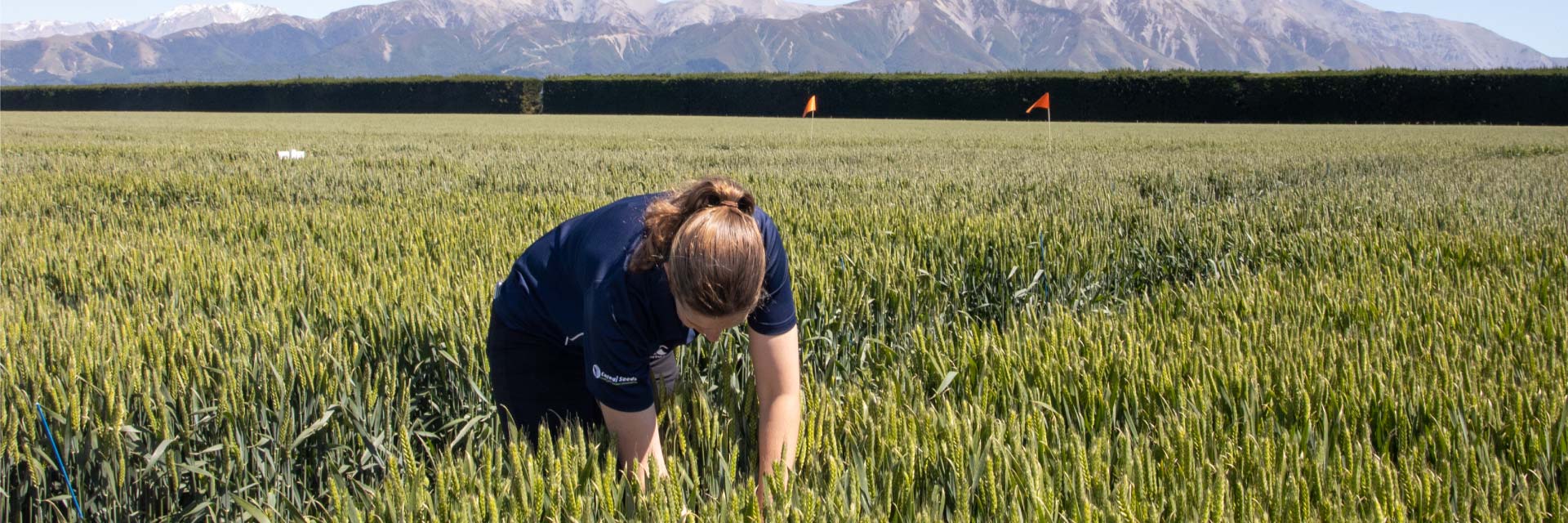
The origin of the cereal breeding effort at PGG Wrightson dates back to the 1980’s with both PGG and Wrightsons running small breeding programmes targeting the NZ milling wheat industry. In the early 1990s Wrightsons released ‘Monad’ – a cultivar through the ‘90s and early ‘00s that set new benchmarks for dough strength and pre-harvest sprouting resistance. In the early 2000’s PGG released ‘Torlesse’ – setting new standards for crop type and yield potential in the medium strength milling wheat category.
Following the merger of PGG and Wrightsons in 2005 this programme was maintained at a base level through the ‘00s. However it was becoming clear that such a small programme was unlikely to consistently deliver market-leading varieties and, in response, the programme was ramped up substantially. This increased effort included significant investment in specialist drilling, harvesting and quality evaluation equipment to accommodate a serious breeding effort across both milling and feed wheat classes. The breeding programme now makes around 150 crossings and evaluates approximately 7000 new inbred lines annually. This programme now generates around 400 new milling and feed wheat lines each year that are selected to enter into the first stage of multi-site yield testing where they are compared with industry leading standard cultivars and other new lines from overseas breeding programmes.
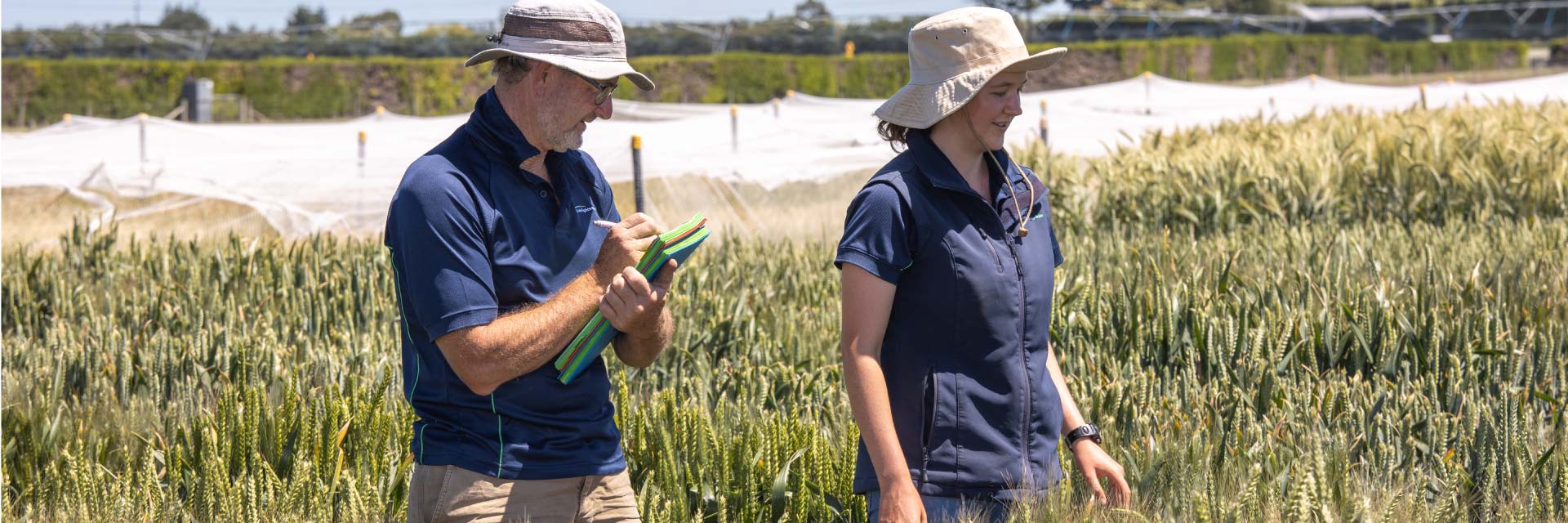
In parallel with the in house breeding, approximately 300 elite breeding lines are introduced annually from several international breeding programmes with a similar growing environment to NZ. These programmes have been the most significant source of market-leading feed wheat, biscuit and medium strength bread wheat cultivars in the last two decades. The barley evaluation programme has had less impact during that same time frame, delivering only a handful of minor varieties. However this programme has also been significantly expanded and modernized so that the very best performing European germplasm can be identified early, fast-tracked through the evaluation pipeline and brought to market in future.
Both the introduced germplasm and the lines bred by PGG Wrightson Grain enter the same evaluation process progressing through two years (Y1 then Y2) of multi-site trials throughout Canterbury. Only the top performing 10-15% of lines are promoted from Y1 to Y2 and only 2-4 lines in each series, that must consistently out-perform current industry standards across trial sites, are selected for entering into FAR-coordinated cereal performance trials (CPT). CPT is another two-tiered system whereby lines are trialled for 1-3 years in tier 1 (CPT1) and then, based on merit (independently governed by FAR) promoted to CPT2. The production of high grade seed also begins when lines are in the first year of CPT2 so that at the end of the second year of CPT2 there is commercial seed available (typically 50-100 tons).
Another recent development has been to establish a closer breeding relationship with some of our key European collaborators and we now have pre-commercial crossing agreements with them. This enables us to make crosses with superior lines as soon as they are identified (as early as the end of Y1 trials) rather than having to wait until they are commercial cultivars – a gain of up to 5 years in the breeding cycle. This is very much a two–way street and these partners are also evaluating PGG Wrightson Grain bred lines in Europe for both release there and their potential breeding value.
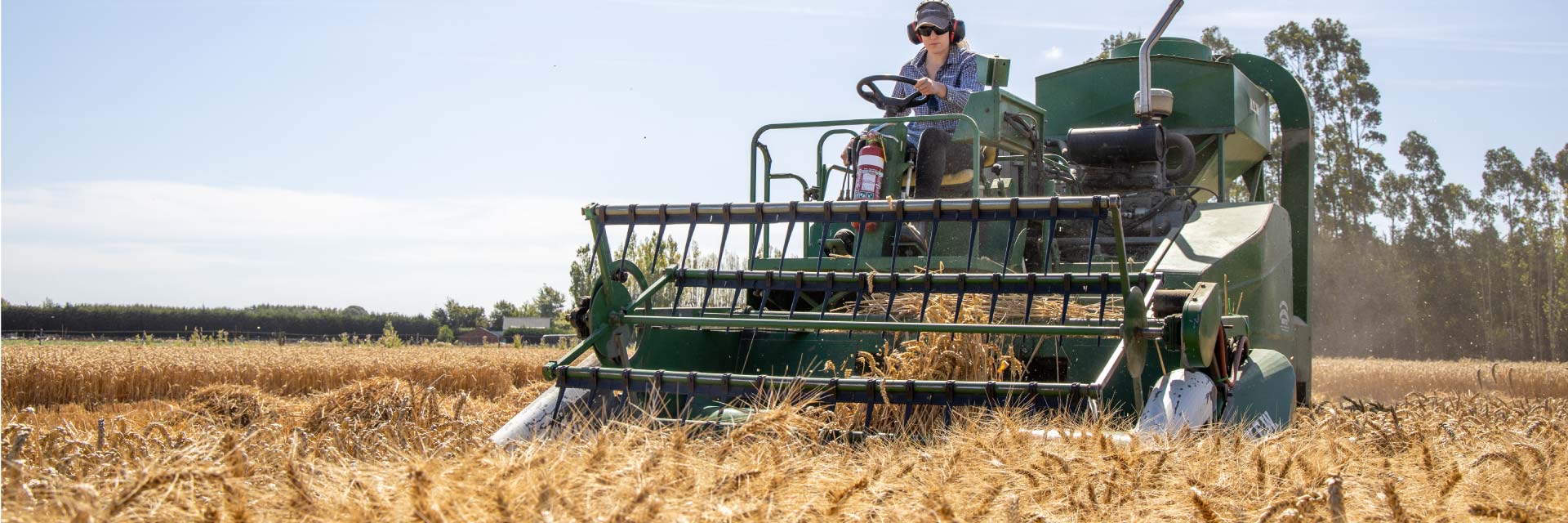
The majority of the industry-wide commercially focussed arable research in NZ is channelled through FAR. The CPT system, coordinated by FAR, plays a key role in both comparing the performance of current commercial cultivars and bringing new cultivars to market and most wheat and barley cultivars in NZ have been through this system. CPT operates at two levels. The most advanced stage (CPT2) has the main function of comparing the leading existing cultivars and a few new cultivar candidates across the spectrum of growing regions in Canterbury, Southland and the Manawatu/Rangitikei. It is fully funded by FAR.
CPT1 is restricted to Canterbury and acts as a final stage yield testing platform for the best advanced lines from various seed companies. These companies contribute to the system by running one or more trial sites and PGG Wrightson Grain is one of these, contributing 5 trial sites annually across the main crops. Finally, the CPT also includes independent assessment of the disease resistance/susceptibility of each entry and the pre-harvest sprouting resistance of the wheat lines. In addition to the CPT system, FAR has numerous other projects and PGW may be involved in some of these.
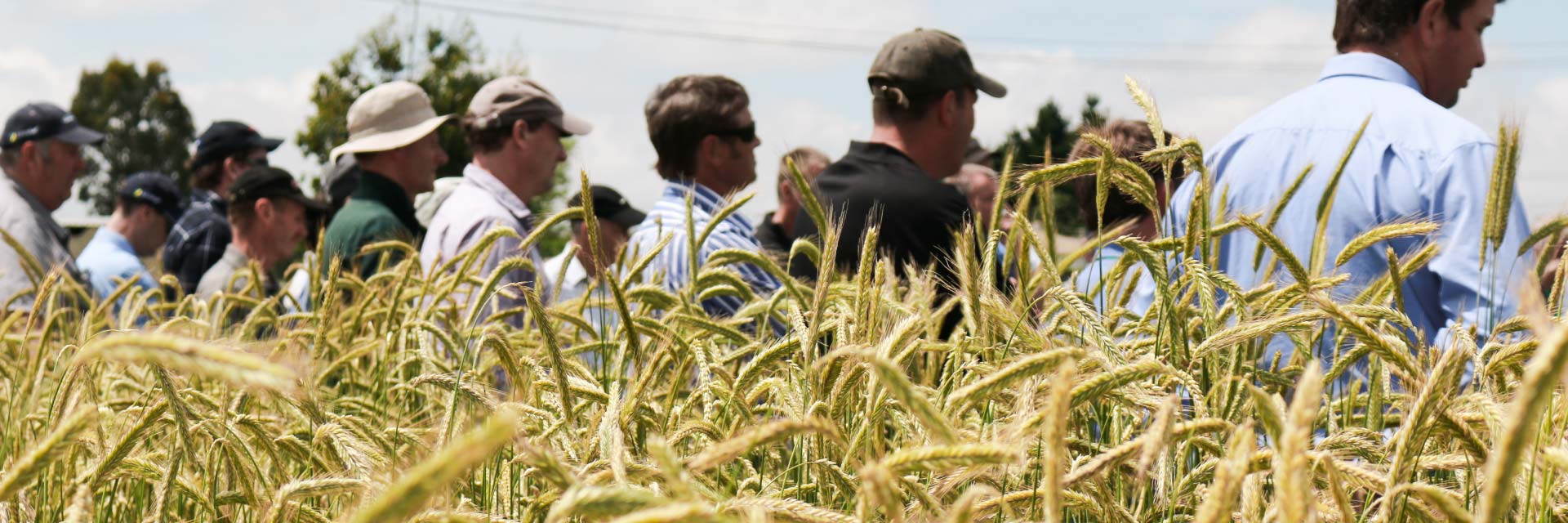
PGG Wrightson Grain provides nursery services for overseas breeding companies. At present the main counter-season spring cereal nursery is for a breeder in Denmark including barley, wheat and oats. Current nursery size is around 3,800 plots.
Counter-season cereal nurseries provide accelerated breeding by screening and selecting early and mid-generation germplasm with selections harvested and returned to the client for planting in the Northern Hemisphere spring season. Field management, as per the client’s request, is part of the nursery package to ensure reliable selections based on disease resistance and plant type are available.
These nurseries can also be designed as straight mini-multiplications if there are no selection preferences required.
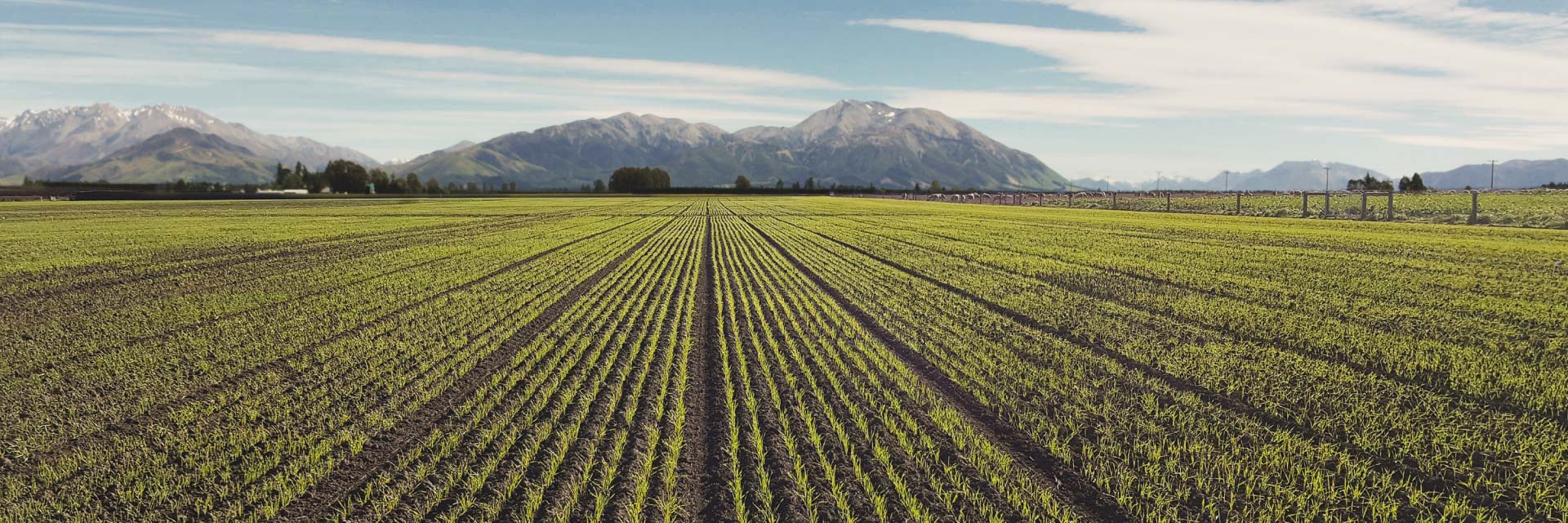
Nick Brooks
Product Development Manager Christchurch
Ian Ormandy
Cereal Seed & Milling Wheat Manager
Lincoln, Canterbury
Steve Shorter
Cereal Breeder
Lincoln, Canterbury
Ashley Harrison
Agronomist - Cereal Lincoln, Canterbury
Sarah Whiteman
Assistant Cereal Breeder Lincoln, Canterbury
